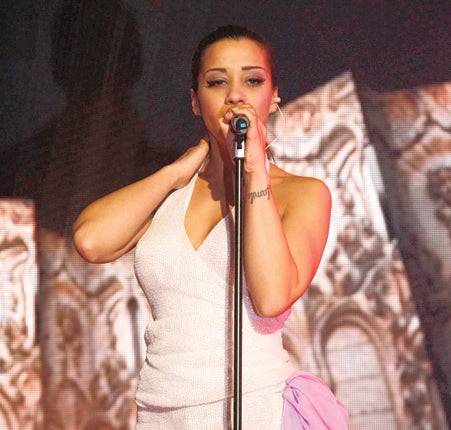HIV-positive pop singer Nadja Benaissa admits having unprotected sex

Your support helps us to tell the story
From reproductive rights to climate change to Big Tech, The Independent is on the ground when the story is developing. Whether it's investigating the financials of Elon Musk's pro-Trump PAC or producing our latest documentary, 'The A Word', which shines a light on the American women fighting for reproductive rights, we know how important it is to parse out the facts from the messaging.
At such a critical moment in US history, we need reporters on the ground. Your donation allows us to keep sending journalists to speak to both sides of the story.
The Independent is trusted by Americans across the entire political spectrum. And unlike many other quality news outlets, we choose not to lock Americans out of our reporting and analysis with paywalls. We believe quality journalism should be available to everyone, paid for by those who can afford it.
Your support makes all the difference.A singer who transformed herself from a teenage crack addict to become the star of one of Germany's most popular girl bands broke down in court as she admitted to having unprotected sex despite knowing that she was HIV-positive.
Nadja Benaissa, who rose to fame with the pop group No Angels, was charged last year with one count of grievous bodily harm for allegedly infecting her partner with HIV in 2004. She faces two further charges of attempted bodily harm for having unprotected sex with two other men who did not catch the HIV virus.
Dressed in a purple blouse with her hair in a ponytail, Ms Benaissa appeared in a court in Darmstadt, near Frankfurt, yesterday for the start of a five-day trial which could see her jailed for up to 10 years if convicted.
She broke down as her lawyer, Oliver Wallasch, read out a statement in which she admitted to having unprotected sex despite knowing she was infected. "I am sorry from the bottom of my heart," the statement read. "No way did I want my partner to be infected."
The case has received widespread press interest in Germany and has caused concern among Aids campaigners who have criticised the way the 28-year-old singer has been treated by both the police and media.
Ms Benaissa, whose band has sold more than 5 million records, was arrested in Frankfurt last year just hours before she was due to perform a concert at a nightclub. She was led away in front of her fans and incarcerated for 10 days prompting criticism from HIV campaign groups who said the singer had been subjected to a public "witch hunt". Under German law, failing to disclose being HIV-positive before having unprotected sex is punishable by up to 10 years in prison. The tariff can be extended to life if the person goes on to die of Aids.
Ms Benaissa, who is of Moroccan and Roma descent with German citizenship, is accused of having had sex with three men between 2000 and 2004 without informing them of her condition. The trial is taking place in a juvenile court because the first alleged offences took place when she was 17.
In the courtroom yesterday the singer came face to face with her primary accuser, a 34-year-old man who is HIV-positive. His identity has been kept secret for the trial. "We had sex between five and seven times, about three of those were unprotected," the man told the court. It was only when an aunt informed him that Ms Benaissa was HIV-positive that he went to see a doctor. "[After] a few hours he called me and said I should go to see him," he said. "It was then I knew I was positive."
In her opening statement, Ms Benaissa gave an insight into her troubled life as a teenager which led to her becoming HIV-positive.
"When I was 12 years old I had problems and fell in with the wrong circle of friends," she said. "I fell off the rails and took drugs – alcohol and grass. When I was 14 I became addicted to crack without knowing what it was. I ended up on the streets."
The court heard how Ms Benaissa became pregnant two years later. Following a routine blood test, she discovered that she was HIV-positive but said she did not know who had infected her.
She told the court that she kept her condition secret because she was initially scared of her daughter being stigmatised, and later because she feared it could affect the band's success.
"I'd been told the likelihood of infecting someone or that I would develop the illness [Aids] was more or less zero," she added. "For that reason, I kept the news, even from my close group of friends, [as] I didn't want my daughter to be stigmatised. I told the band members because I trusted them but I never made it public because I feared that it would mean the end of the band."
No Angels were formed in 2000 after Ms Benaissa and her three bandmates won a reality talent contest called Popstars. The band went on to become Germany's best selling all-girl group before breaking up in 2005. They reformed three years later to become Germany's entry for Eurovision and have remained a band since.
Over the coming five days the court is expected to hear from the two other men with whom Ms Benaissa is accused of having unprotected sex, as well as from her bandmates. The defence is expected to bring in medical experts who will question whether the court can prove the 34-year-old man was infected by the singer or someone else.
Join our commenting forum
Join thought-provoking conversations, follow other Independent readers and see their replies
Comments